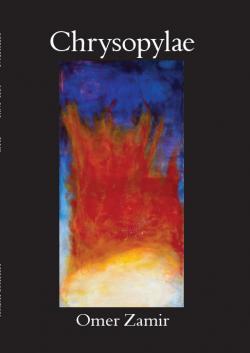Chrysopylae
Israeli-born poet Omer Zamir’s latest volume of poems is filled with
passion, bold experimentation, and a skill at word smithing and image-making
that is nothing short of brilliant! The range of subjects has breadth and maturity
and contrast; the lyrics soar from youthful exuberance to edgy, embittered, even
nightmarish darkness. Always, they are crafted with both precision and
provocative spontaneity that continually surprises with its juxtapositions, original
images, and free but sculpted meter. Many seem to be experimentations in voice
and form: some taut and terse, others densely longer and laden with complex
syntax and imagery, intricate yet varied use of devices such as internal rhyme or
alliteration or assonance, but all with a mastery of the English language that is
astounding and with an innate musicality that underscores the verse with its
emotion. But perhaps what is most striking about them is their unsparing honesty
from the open declaration of love and sensuality in “Yeah,” to the haunting
mournfulness of “Matthew,” to the anguished memories of “She and He,” or the
disturbingly powerful “The Passion.”
Self-taught as a writer, Zamir has clearly been reading a wide range of great
literature, and one hears echoes of writers like James Joyce, Gerard Manley-
Hopkins, even of visionaries like William Blake. But his verse is far too
spontaneous and authentic to be anything but singular.
-Carla Maria Verdino-Süllwold

Israeli-born poet Omer
Israeli-born poet Omer Zamir’s latest volume of poems is filled with
Ishamwai bord poan Omera Zamira latesh volumo ota poema ana filo comand
passion, bold experimentation, and a skill at word smithing and image-making
pasona bolama experemanta ahwe skilo matera word commanda imishma imo solar
that is nothing short of brilliant! The range of subjects has breadth and maturity
and contrast; the lyrics soar from youthful exuberance to edgy, embittered, even
nightmarish darkness. Always, they are crafted with both precision and
provocative spontaneity that continually surprises with its juxtapositions, original
images, and free but sculpted meter. Many seem to be experimentations in voice
and form: some taut and terse, others densely longer and laden with complex
syntax and imagery, intricate yet varied use of devices such as internal rhyme or
alliteration or assonance, but all with a mastery of the English language that is
astounding and with an innate musicality that underscores the verse with its
emotion. But perhaps what is most striking about them is their unsparing honesty
from the open declaration of love and sensuality in “Yeah,” to the haunting
mournfulness of “Matthew,” to the anguished memories of “She and He,” or the
disturbingly powerful “The Passion.”
Self-taught as a writer, Zamir has clearly been reading a wide range of great
literature, and one hears echoes of writers like James Joyce, Gerard Manley-
Hopkins, even of visionaries like William Blake. But his verse is far too
spontaneous and authentic to be anything but singular.
-Carla Maria Verdino-Süllwold